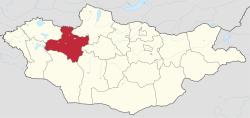Zavkhan Province
| Zavkhan Province Завхан аймаг ᠵᠠᠪᠬᠠᠨᠠᠶᠢᠮᠠᠭ | |||
|---|---|---|---|
| Province | |||
 | |||
| |||
 | |||
| Coordinates: 48°0′N 96°15′E / 48.000°N 96.250°ECoordinates: 48°0′N 96°15′E / 48.000°N 96.250°E | |||
| Country | Mongolia | ||
| Established | 1931 | ||
| Capital | Uliastai | ||
| Area | |||
| • Total | 82,455.66 km2 (31,836.31 sq mi) | ||
| Population (2011) | |||
| • Total | 65,481 | ||
| • Density | 0.79/km2 (2.1/sq mi) | ||
| Time zone | UTC+8 | ||
| Area code(s) | +976 (0)146 | ||
| ISO 3166 code | MN-057 | ||
| Vehicle registration | ЗА_ | ||
| Website |
www | ||
Zavkhan (Mongolian: Завхан, Zawhan) is one of the 21 aimags (provinces) of Mongolia, located in the west of the country, 1,104 km from Ulaanbaatar. Its capital is Uliastai. The aimag is named after the Zavkhan River, which forms the border between Zavkhan and Gobi-Altai aimag.
Environment
Locally, Zavkhan's environment is considered "Gobi-Khangai" (Говь хангай), since it connects the Gobi Desert in the south with the western Khangai Mountain Range and the broad lake basin of Khovd aimag.
The highest peak in the province is Otgontenger (Отгонтэнгэр, lit. "youngest sky") both the highest (4,031 m) and only peak in the Khangai range capped with a permanent glacier. The mountain is located in the 95,510 hectare Otgon Tenger Strictly Protected Area, about 60 km east of Uliastai. An image of the mountain can be seen on the aimag's coat of arms. Otgontenger is associated with the Bodhisattva Ochirvaani (Очирваань).
The western and south-western regions of Zavkhan contain the massive Bor Khyarin Els sand dunes that stretch for over 100 km within the Zavkhan, down into Gobi-Altai aimag. One of the largest lakes in Zavkhan, Bayan Nuur (баян нуур, "rich lake") is nestled among the dunes.
Climate
Most precipitation falls in the summer months as rain, with some snow in the adjacent months of May and September. Winters are typically very dry.
Zavkhan has some of the coldest winter temperatures in Mongolia. It has even been known to snow in Summer. In Tosontsengel, the largest soum in Zavkhan, winter temperatures as low as −52.9 °C (−63.2 °F) have been recorded. The soum also holds the record for the highest barometric pressure ever recorded on Earth 1,085.7 hectopascals (32.06 inHg), measured on 19 December 2001.[1]
Wildlife
Aside from having massive livestock populations, Zavkhan's broad ecological regions and deep forests are home to a diverse population of wildlife: Gobi bears, Mongolian khulans, wild boars, spotted deers, argali, wild goats, ibexes, Mongolian wolves, Corsac foxes, marmots, mongooses, Eurasian lynxes, hares, and both Mongolian and goitered gazelle.
Many forest, mountain and migratory birds can be found in the aimag, including rare Snow cocks and Bobwhites, as well as swans, vultures, falcons and hawks.
Fishing is a popular pastime in Zavkhan. Khar Nuur and Bayan Nuur lakes are rich with fish, and many of the hundreds of smaller rivers throughout the province provide decent fishing.
Population
Population growth in Zavkhan aimag stopped in 1994, then migration out of the aimag (approx. 40,000 in 1995-2005) reduced its population to the end of 1979 level. The majority of the population is ethnic Khalkha but there are sizable Khotgoid and Kazakh minorities.
Zavkhan aimag population[2] [3] [4] 1956
census1960
est.1963
census1969
census1975
est.1979
census1981
est.1989
census1990
est.1992
est.1994
est.1996
est.1998
est.2000
census2002
est.2005
est.2008
est.55,100 61,000 60,000 70,800 76,000 79,800 81,700 88,500 91,960 102,834 103,150 102,341 100,905 87,686 83,516 78,668 76,614
Notable Natives & Residents
- Punsalmaagiin Ochirbat, First President of Mongolia (1990-1997)
- Natsagiin Bagabandi, Second President of Mongolia (1997-2005)
- S. Damdinbazar Mongolian Jalkhanz Khotagt (Жалханз Хутагт, "reincarnated saint") Independence activist and Prime Minister of Mongolia (1922-1923)
- Begziin Yavuukhulan, Soviet Poet
- B. Jamsranjav, Mongolian Saint, Lama
- S. Chimedtseren, Mongolian Saint, Lama
Economy
Herders breed each of the "5 Kinds" (5-н хошуу мал)of animal in Zavkhan. In 2005, the aimag was home to 2,1 million head of livestock, among them 1,03 million sheep, 861,000 goats, 107,000 cattle and yaks, 101,000 horses, and 6,300 camels.[5]
The area is also rich with mineral resources such as iron ore, tin, gold, copper, diamonds, molybdenum ore, and phosphorite. While Zavkhan's mineral wealth remains largely been unexploited, in 2012 the Golden Hill Project mine was built by Bayan Airag Exploration LLC outside of Durvuljin soum. [6]
Transportation
The old Uliastai Airport has two unpaved runways and is located close to the city, but it has no regular flights operating. Since 2002, the Donoi Airport (or "New Uliastai Airport") with one unpaved runway is located about 25 km west of the city and gets served by regular flights to and from Ulaanbaatar.
Administrative Subdivision

The Sums of Zavkhan Aimag Sum Mongolian Population [7](2005) Aldarkhaan Алдархаан 3,708 Asgat Асгат 1,125 Bayankhairhan Баянхайрхан 1,968 Bayantes Баянтэс 3,024 Dörvöljin Дөрвөлжин 2,323 Erdenekhairkhan Эрдэнэхайрхан 1,771 Ider Идэр 2,714 Ikh-Uul Их-Уул 6,271 Nömrög Нөмрөг 1,848 Otgon Отгон 3,478 Santmargats Сантмаргац 2,101 Shilüüstei Шилүүстэй 2,450 Songino Сонгино 1,921 Telmen Тэлмэн 2,820 Tes Тэс 3,230 Tosontsengel Тосонцэнгэл 9,045 Tsagaanchuluut Цагаанчулуут 1,496 Tsagaankhairkhan Цагаанхайрхан 1,823 Tsetsen-Uul Цэцэн-Уул 2,114 Tüdevtei Түдэвтэй 2,003 Uliastai * Улиастай 15,742 Urgamal Ургамал 1,822 Yaruu Яруу 2,547 Zavkhanmandal Завханмандал 1,324 - * The aimag capital
References
- ↑ "Highest Sea Lvl Air Pressure Above 750m". Wmo.asu.edu. 2001-12-19. Retrieved 2013-01-13.
- ↑ National Statistical Office Archived June 7, 2007, at the Wayback Machine.
- ↑ National Economy of the Mongolian People's Republic (1921 - 1981), Ulaanbaatar 1981
- ↑ Zavkhan Aimag Statistic Office Annual Report 2008 Archived July 22, 2011, at the Wayback Machine.
- ↑ Zavkhan Aimag: official website Archived July 7, 2007, at the Wayback Machine.
- ↑ Bayan Airag Exploration LLC: official website
- ↑ Zavkhan Aimag: Сумдын Танилцуулга Archived November 1, 2008, at the Wayback Machine. (Introduction to the Sums)


